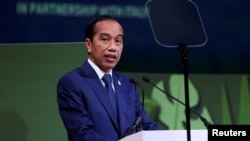The White House said it has not received confirmation from Indonesia — president of this year’s Group of 20 (G-20) economic forum — that it has invited Ukrainian President Volodymyr Zelenskyy to its November summit in Bali.
“We’ve seen the reports that President Zelenskyy has been invited to the G-20 and we certainly welcome that,” White House press secretary Jen Psaki told reporters Wednesday. “As you know, President Biden said just last month that Ukraine should be able to participate. But we don't have further confirmation beyond the news reports, which we certainly think are positive.”
Zelenskyy on Wednesday tweeted that he’d had discussions with Indonesian President Joko Widodo and thanked him for his support of Ukraine’s “sovereignty and territorial integrity, in particular for a clear position in the U.N.”
“Appreciated inviting me to the G-20 Summit,” he said.
In a tweet about the conversation Thursday, Widodo did not mention an invitation.
“Yesterday I spoke to President Zelenskyy of Ukraine,” Widodo posted. “I reiterated Indonesia’s support to any efforts for peace negotiations to succeed and stand ready to provide humanitarian assistance.”
Indonesia in March supported two resolutions at the United Nations General Assembly condemning the Russian invasion of Ukraine but abstained on the third resolution, along with 57 other U.N. members, to expel Moscow from the U.N. Human Rights Council.
No announcement
Analysts have pointed out that Widodo’s government is stuck with the impossible task of attempting consensus on the world’s most pressing economic problems while navigating new geopolitical rivalries triggered by Putin’s invasion.
While Moscow was kicked out of the Group of Eight (G-8), now known as the Group of Seven (G-7), following its 2014 annexation of Crimea, the G-20 is a much wider grouping with many more competing interests. It includes China, which supports Russian involvement.
“I think Indonesia is trying to split the baby here,” said Gregory Poling, who researches U.S. foreign policy in the Asia Pacific at the Center for Strategic and International Studies.
“They don't want the U.S. and other members of the G-7 to not show up. They also don't want to be put in the position of disinviting Putin,” he told VOA.
After meeting with NATO members and European allies in Brussels last month, U.S. President Joe Biden suggested Kyiv be able to attend G-20 meetings as an observer should other members disagree to kick Russia out.
Biden, who is building a global coalition against Putin beyond Europe, has not said he would boycott the G-20 summit should the Russian leader attend, but insists the forum cannot be "business as usual." Canadian Prime Minister Justin Trudeau and Australian Prime Minister Scott Morrison have also raised concerns about Putin’s participation.
Earlier this month, U.S. Treasury Secretary Janet Yellen skipped several G-20 ministerial meetings to protest Russian officials’ attendance. Other Western officials did the same.
Jakarta's dilemma
Jakarta’s dilemma is symptomatic of Moscow’s considerable influence around the world, including its energy and military ties with Indonesia.
Last month, following intense Western pressure, Indonesia put on hold plans for the state’s oil and gas company to purchase cheap Russian crude oil amid soaring global energy prices. Moscow has a glut of oil it is offering at a huge discount to countries willing to defy Western sanctions, including China and India.
Senior Indonesian officials have pushed back against Western pressure on the issue of G-20.
Member states must work in unison to create stability and prosperity together, Indonesian Finance Minister Sri Mulyani Indrawati told VOA’s Indonesian Service last week.
“This is one of the most important [thing] for us — to support the idea of cooperation that needs to be maintained and should not [be] characterized in such a very binary, simple way,” she said.
So far Moscow has not announced a change in plans for Putin to attend the summit in person.
Earlier this month the Biden administration signaled it wants the G-20 to discuss the international economic repercussions of the Russian invasion and potentially Ukraine’s reconstruction. That idea is likely to create further rift in the economic forum.
Earlier this week, Luhut Binsar Pandjaitan, Indonesia’s coordinating minister for maritime affairs, told VOA’s Indonesian Service his government will “see what happens.”
“Nobody losing face," he said. "That, I think, is the best.”
Eva Mazrieva and Virginia Gunawan from VOA Indonesia Service contributed to this report.




